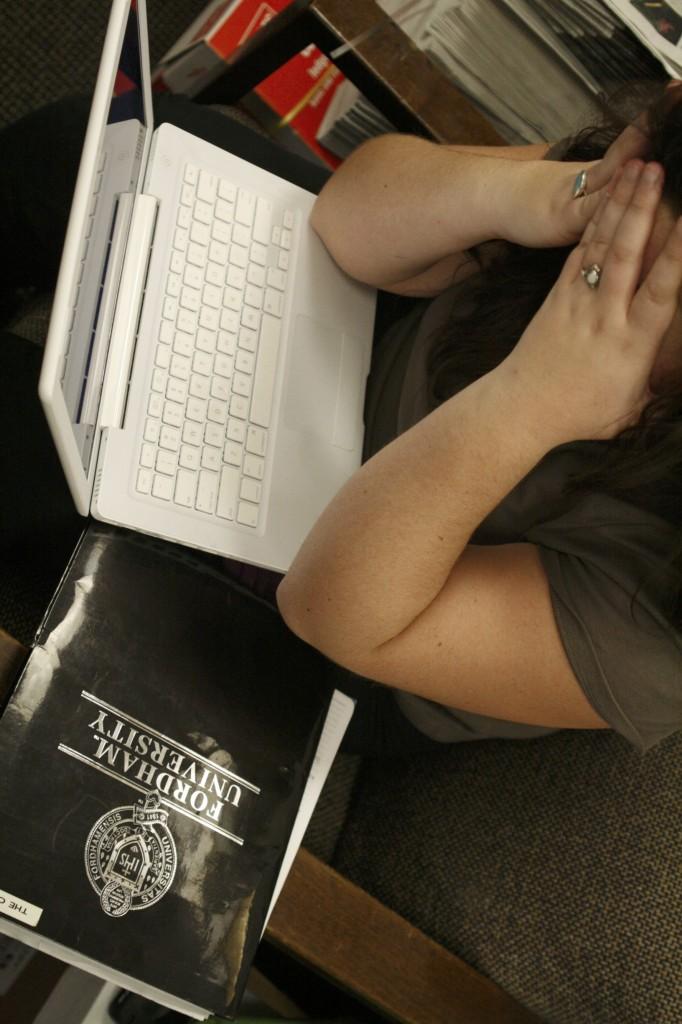The True Value of a Dollar: Student Loans and the Economy
The Credit Crisis Is Leaving Many Students Wondering How They Will Pay for College
June 5, 2011
Published: October 30, 2008
We can all agree that the economy is nowhere near as stable as it was one year ago. Although we may not want to acknowledge it, we are all being affected by it in one way or another. For me, the unstable economy has caused a substantial amount of stress and has even led me to question my decision to come to such an expensive private school.

When I was a senior in high school, I had the daunting task of choosing which college would be my best fit. I had several conversations with my parents about my college choices, and my parents made it clear that the cost of the school, as well as how much financial aid the school would offer me, should bear no weight on my decision. With my parents’ reassurance, I chose to attend Fordham, a private college that would, without a doubt, put a very deep dent in my father’s wallet. My parents knew that the excellent education I would receive over the next four years would make up for the thousands of dollars in private loans they would be forced to take out in their names.
Prior to beginning my freshman year, my father signed up for a private loan through J.P. Morgan Chase, and he was approved with the reasonable interest rate of 5.6 percent. In the spring of 2008, the economy began to show signs of a decline with the sudden rise of foreclosures on homes across the United States. People who had purchased houses were now defaulting on their mortgage payments, which gave banks the difficult task of selling the properties for thousands of dollars less.
It was during this time that I made the decision to begin commuting from home the following year. I believed it was the best thing to do because I didn’t want to force my parents to have to take out so much money in loans simply because of my desire to live in the city. I was home practically every weekend anyway, so they were paying thousands of dollars for a dorm in which I rarely spent time. I also began looking toward the future, something I had previously chosen to overlook, and I realized that my dream of attending law school would never be possible if I was already going to be in thousands of dollars in debt before I’d even get there.
In the summer, my father signed up for a loan through J.P. Morgan Chase for the second time but was given an interest rate far greater than the one offered the previous year. I quickly learned that, as a result of the rash of defaulted mortgage payments, banks were beginning to raise interest rates on private loans in order to make up for all their losses. I looked into other student loan companies and their private student loan options, but in the end, I found that the interest rate given by Chase was still substantially less than those offered by other lenders.
With news of the economic crisis in mid-September, the stress I had been experiencing because of my finances increased ten-fold. If the economy continued in this downward trend, how was I going to be able to take out a loan for next year? What course of action could I take if I wasn’t approved for a loan? Financial experts answered my questions and reported that loan companies would continue to give out student loans, but would require there to be higher interest rates and a more rigorous criteria to qualify for the loan.
Today, I’m thankful for having made the decision to save money by commuting, but I still can’t help but worry about the future and wonder if and how I’ll be able to pay for college. As a result of my uncertainty about the future of our economy, I’ve cut down on my spending and have even begun thinking of getting a part-time job, just to be on the safe side. I’m certain that many other students across the United States, especially those who chose to attend private schools, are also feeling the economic crunch as tuition costs and interest rates continue to rise. My only hope for the future is that the financial bailout will help to stimulate our economy and help college students be able to afford a private school education without the stress of having to pay back loans for the rest of their lives.









